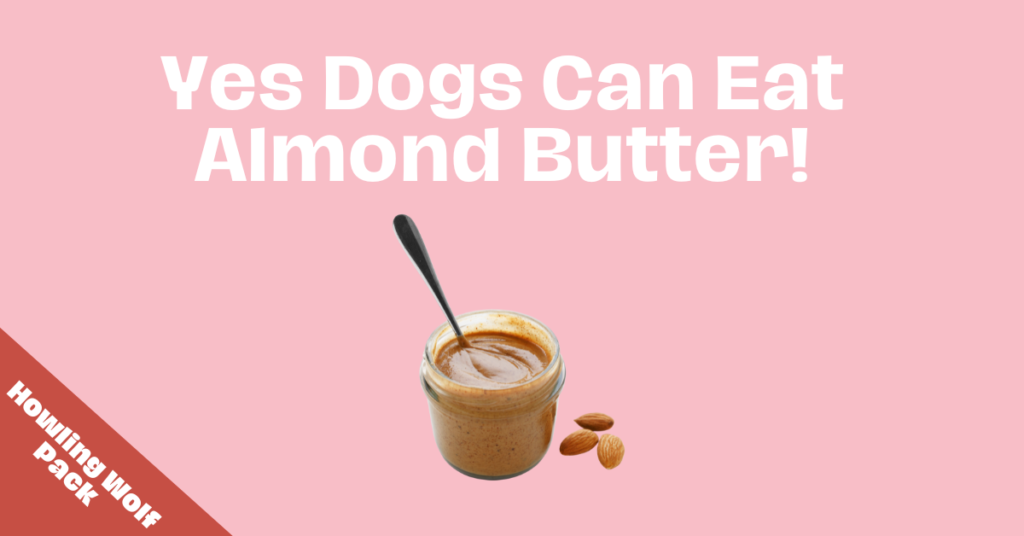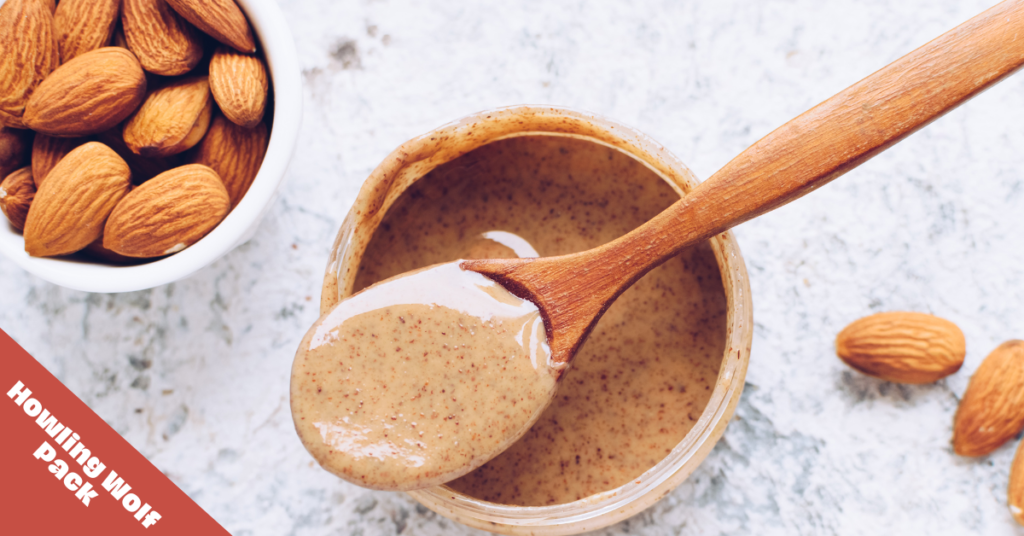I remember the first time I caught my dog, Makai, staring at my almond butter toast like it was the best thing ever! Those puppy eyes can be hard to resist, but can dogs eat almond butter?
Yes, your dog can eat almond butter, but there are some important things to keep in mind. While almonds aren’t toxic to dogs, not all dogs can digest them well. Plus, almond butter is high in fat, which can upset your dog’s tummy if given in large amounts.
In this article, we’ll explain everything you need to know about giving almond butter to your dog. We’ll talk about the benefits, the risks, and what you need to watch for if you decide to share this snack with your pup.
Can Dogs Eat Almond Butter?
Dogs are curious, especially when it comes to food and the delicious smell of almond butter is sure to get that wet nose sniffing!
Almond butter is made from—you guessed it—almonds! While almonds aren’t toxic to dogs like some other nuts (macadamia nuts), not all dogs can handle almonds. Just like people, some dogs can have food allergies.
Additionally, almond butter can also have extra ingredients like salt and sugar, which aren’t good for your pup. They can even include toxic ingredients like the artificial sweetener xylitol—a sugar substitute that is fatal for dogs.
Whenever feeding almond butter to your dog, always read the label to make sure there are no harmful ingredients inside.
If you’re not sure, it’s always best to ask your vet before giving your dog new foods. While it’s tempting to share all your favorite snacks with those adorable eyes staring up at you, a dog’s nutritional needs are different from ours!

Potential Benefits of Almond Butter for Dogs
There are some risks, but are there any benefits to giving your dog almond butter? Let’s find out.
- Healthy fats: Almond butter has healthy fats that can be good for your dog’s skin and coat. Think shiny, healthy fur that everyone will admire!
- Essential vitamins and minerals: Almond butter has vitamin E, magnesium, and some protein which are essential for a healthy body. While your dog won’t be getting a huge boost of these from the occasional lick of a spoon, the presence of them makes it a healthier alternative to fatty, store-bought treats.
- Canine enrichment: A small amount of almond butter can be a wonderful treat for dogs. The new taste can be a great way to add enrichment to their lives.
Risks of Feeding Almond Butter to Dogs
Just like with any new food, there are always risks associated with introducing a new food into a dog’s diet.
- Choking and digestive issues: Almonds are not easy for dogs to digest, and chunky almond butter can be a choking hazard. If your dog is like mine, they eat everything like a vacuum, which makes choking a real risk. Dogs eat quickly, and this can make choking on nut butter or raw nuts more likely.
- High-fat content: Almond butter has a lot of fat. Too much fat can lead to pancreatitis, a painful condition that inflames a dog’s pancreas. Additionally, high-fat content can cause digestive problems and might even make your dog vomit.
- Added ingredients: Most store-bought almond butters will contain added ingredients like salt and sugar which are not well tolerated by your dog. If you have the time, it might be worth making your own almond butter so you know exactly what is in the butter.
- Xylitol: Xylitol is extremely dangerous for dogs. Even a tiny amount can cause a huge drop in blood sugar or even liver failure. Always check the label to make sure your almond butter doesn’t contain xylitol or other harmful artificial sweeteners.

Signs of Almond Butter Allergy or Toxicity in Dogs
Whenever you feed almond butter to your dog for the first time, always keep an eye on them for any signs of allergies or stomach upset. Here’s what to look for:
- Allergies in dogs: Just like us, dogs can have allergies too. Symptoms can include itching, swelling, or even hives. If your dog starts scratching like crazy, almond butter might be the problem. Take a trip to the vet if you notice these symptoms.
- Upset stomach: Vomiting, diarrhea, and tummy aches are all warning signs that your dog can’t tolerate almond butter well. If your dog already has a sensitive stomach, almond butter might be too rich for them and should be avoided.
- Severe allergic reaction: Anaphylactic shock is an allergic reaction that can be life-threatening. It usually occurs immediately after eating the allergen, with signs showing very quickly (seconds and minutes). Signs of anaphylaxis include diarrhea, vomiting, pale gums, cold limbs, and seizures.
If you notice any signs your dog is not feeling well, take a trip to the vet for medical help.
How to Safely Give Almond Butter to Your Dog
If your dog is able to tolerate almond butter and they enjoy the delicious taste, here is what to consider when adding almond butter to your dog’s diet.
- Choose the right almond butter: Not all almond butter is the same. Pick one that’s as plain as possible. Avoid almond butter that contains xylitol and added flavors. Try to choose one that has no sugar or salt. It might be best to make your own when possible.
- Give small amounts: A teaspoon for small dogs and maybe a tablespoon for large dogs. Remember, less is more! Almond butter is calorie-dense, and too much can lead to weight gain.
- Fun ideas for serving almond butter: Spread a little almond butter inside a puzzle toy or use it as a special treat during training. My dog loves it when I hide it in his KONG toy—it keeps him busy and happy. You could also share roasted nuts like roasted almonds or roasted cashews with your dog in moderation, but make sure they are unsalted/unflavored and safe.
Alternatives to Almond Butter for Dogs
If almond butter sounds like too much trouble to make and you can’t find one with no salt or sugar, there are other nut butters that are safe for dogs that you can explore.
- Peanut butter and cashew butter: Peanut butter is the all-time favorite. Most dogs love peanut butter! Cashew butter is also yummy, but it can be very rich and cause stomach upset if given in large amounts.
- Other healthy treats: Not all treats have to be made from nuts! Pears, mulberries, or even plain yogurt can be a fun, healthy treat for your dog. Raw nuts like raw cashews are also okay in very small amounts, but watch out for the fat content and risk of choking.
- Homemade treat recipes: If you like making your own dog treats, there are lots of recipes that use nut butters safely. Just make sure there are no harmful ingredients or artificial sweeteners that could cause health problems.
Final Thoughts
Almond butter can be a safe and tasty treat for dogs, but only if given in moderation and without harmful ingredients like xylitol. Keep an eye out for stomach upset and allergies and if the butter is too rich for your pup, try introducing some fresh fruit or veg as a healthy alternative.
Though most pet parents want to share their human food with their pup, it’s important to only give as an occasional treat to ensure your dog’s health isn’t negatively impacted.
